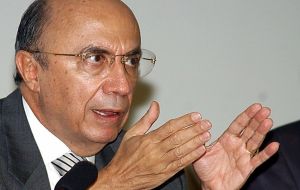MercoPress. South Atlantic News Agency
Brazil GDP expands at ‘Chinese pace’9%; rates increase forecasted
 Central Bank President Henrique Meirelles
Central Bank President Henrique Meirelles Brazil’s economy grew at its fastest annual rate since 1995 in the first quarter anticipating expectations that the central bank will raise interest rates 0.75 percentage point Wednesday to prevent overheating.
GDP expanded 9% from a year earlier, faster than any other Latinamerican economy and 2.7% from the previous quarter. However Brazilian officials were quick to underscore efforts to cool the over-heated economy.
“The first quarter was the peak of the economic recovery,” Finance Minister Guido Mantega said in an e-mailed statement. “In the second quarter, figures already show the economy is decelerating.”
Latinamerica’s biggest economy is growing at a “Chinese-like” pace, Itau Unibanco Holding SA, the country’s biggest bank by market value, said in a report last month in which it raised its 2010 growth estimate to 7.5%.
Brazil is the second-fastest growing economy among the BRIC countries, behind China, which expanded 11.9% in the first quarter, ahead of India, which grew 8.6% in the first three months of the year. Russia grew 2.9%.
Bank of America Corp. raised its forecast for Brazilian economic growth this year after Tuesday’s report, saying the economy will expand 7.2% in 2010, up from a previous estimate of 6%.
Economic indicators published in May including unemployment data, retail sales and industrial production outperformed analysts’ forecasts. Central bank President Henrique Meirelles said June 4 that policy makers are in a “tightening mood” as they try to prevent the booming economy from stoking inflation.
The central bank raised the benchmark Selic rate to 9.5% on April 29, after holding it at a record low 8.75% for nine months. After subtracting inflation, Brazil’s real interest rate is 4.24%, the third-highest in the world, after Croatia and Latvia, according to data compiled by Bloomberg.
Inflation, as measured by the government’s benchmark price index, quickened to 5.26% in the 12 months through mid-May, the highest rate in a year. Annual price increases have exceeded the 4.5% mid-point of the government’s target range in each month this year.
IMF Managing Director Dominique Strauss-Kahn said May 25 that Brazil’s economy may grow as much as 7% this year, forcing policy makers to act to prevent overheating.
Mantega said the end of tax cuts, higher interest rates and the euro-zone crisis will help Brazil’s economic growth slow to a “sustainable” level.




Top Comments
Disclaimer & comment rulesCommenting for this story is now closed.
If you have a Facebook account, become a fan and comment on our Facebook Page!